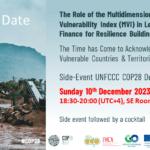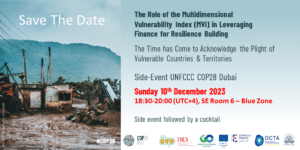
Overseas Countries
and Territories Association

Overseas Countries
and Territories Association

The Time has Come to Acknowledge the Plight of Vulnerable Countries & Territories.
Many countries and territories across the globe are facing grave and mounting threats related to climate change. Any yet, they are not eligible for climate change related funds provided by many of the world’s most important donor institutions and organizations. Though progress has been made in recent years to rectify this, many countries and territories remain underfunded, and increasingly vulnerable. The side event, organized by 5 organizations, will underscore these inequalities and their impacts, and explore the relevance and applicability of better adapted methods for making funding available to those who need it most.
Climate deregulation hits vulnerable territories harder
A new report from UN Climate Change issued on November 14th finds national climate action plans remain insufficient to limit global temperature rise to a maximum of 1.5 degrees Celsius, and meet the goals of the Paris Agreement.
Even with increased efforts by some countries, the report shows much more action is needed now to bend the world’s emissions trajectory further downward and avoid the worst impacts of climate change.
“Today’s report shows that governments combined are taking baby steps to avert the climate crisis. And it shows why governments must make bold strides forward at COP28 in Dubai, to get on track.” said the Executive-Secretary of UN Climate Change, Simon Stiell.
“This means COP28 must be a clear turning point. Governments must not only agree what stronger climate actions will be taken but also start showing exactly how to deliver them.”
The urgency is obvious. It is all the more urgent for the countries and territories most vulnerable to climate change, i.e. those at high risk of being permanently affected by external shocks (drought, rising sea levels, cyclones, etc.). These include most SIDS and many countries that are already economically and socially vulnerable (particularly many LDCs). Yet these countries and territories have a very low carbon footprint and therefore bear virtually no responsibility for current and future climate disorder!
SIDS, for instance, are responsible for only 0.2% of the global carbon emission and yet suffer most from the impact of climate change.
Taking vulnerability into account to better target the countries and territories most at risk from climate shocks
It is now highly recognized that the predominant and conventional manner of identifying countries and territories most vulnerable to climate change has long lacked adequate precision and overlooked many which truly warrant and require support.
This can be observed in the various international agreements, and is mainly due to two reasons:
In December 2019, OACPS (Organisation of African, Caribbean and Pacific States) Heads of State and Government at their 9th Summit in Nairobi, Kenya, “expressed concern about the exclusion of many Small Island Developing States (SIDS) from concessional financial resources* on the basis of their status as middle and high-income countries and the persistent use of per capita GNI (Gross National Income) as a criterion for determining access eligibility.” and called for the establishment of a vulnerability index as a criterion to be used for accessing finance.
In 2021, the United Nations mandated a high-level panel to better define the concept of vulnerability and a universal measure of it. This universality concerns both the three dimensions of vulnerability (economic, social and climatic) and the countries to which it applies, i.e. all of them.
A team from Ferdi has been assisting the United Nations by providing technical support to further this process. This work has been based on Ferdi’s long-standing work on vulnerability, and in particular on the climatic dimension with the Physical Vulnerability to Climate Change Index (PVCCI).
Since October 2022, the OACPS has progressed with work to develop an OACPS Multidimensional Vulnerability Index (OMVI) and OACPS Multidimensional Resilience Index (OMRI). The results show that SIDS, Least Developed Countries (LDCs) and Landlocked Developing Countries (LLDCs) are the most vulnerable and least resilient compared to OECD Members and High-Income countries.
The EU overseas countries and territories represented by OCTA, and the UK overseas territories represented by UKOTA, are likewise often ineligible for many of the climate resilience related financial support mechanisms that are habitually available to many similarly climate change impacted countries and territories. More equitable methods of channeling critical funding to these overseas countries and territories must be adopted to support their efforts to increase their resilience to climate change and integrate carbon emission reduction policies and technologies.
As part of its mission to support sustainable development across these 25 overseas countries and territories, the Green Overseas “GO” Programme (funded by the EU and implemented by Expertise France) is committed to helping identify additional significant private and public funding opportunities, to support the integration and mainstreaming of climate resilience and energy transition.
It is time the world listens to the voices of the countries and territories which are most vulnerable to climate change.
COP28, an unmissable opportunity
Following the release of the IPPC 6th Report last March, the upcoming UNFCCC COP28 offers not only a strategic opportunity for these topics to be addressed, but also a window to engage with relevant strategic stakeholders, especially from both the private and public Finance sectors.
5 organizations working to support climate vulnerable countries and territories have joined forces to organize a high-Level side-event on the 10th of December in Dubai: FERDI, Green Overseas Programme (GO Programme), OACPS, OCTA and UKOTA.
Together, these organizations are working to support the health and wellbeing of millions of people, hundreds of countries and territories, and the natural resources upon which they all depend.
COP28 DUBAI Side Event Details:

The 90-minute side event session to be held in Dubai on the 10th of December (BLUE ZONE – ZONE B6 – Building 85 – SE Room 6) will be mediated by Mr. Ahab Downer, Director of the Green Overseas (GO) Programme; the Mission of the GO Programme is to support climate change resilience and energy transition across the 25 overseas countries and territories of the EU and the UK.
From 6:30 to 8:00 pm (UTC+4), the assembled panelists will bring to light the heart of the problems/challenges, and describe possible, realistic, and implementable solutions which will contribute meaningfully to closing the financial “gap” of the vulnerable countries and territories:
“Though vulnerable developing countries, island nations & territories are minimal contributors to global greenhouse gases, they face disproportionate climate impacts. Acknowledging & rectifying this incongruence is crucial.” explains Mr. Ahab Downer in preparation of the event, while emphasizing that “Ensuring financial aid to fortify the resilience of vulnerable countries & territories is essential – and will help safeguard the well-being of present & future populations on the front lines of climate change.”
Various types of stakeholders are invited to attend this event including finance and environmental ministers and/or representatives from countries and territories that are (currently or likely to be in future) affected by climate change, but also representatives from UN institutions and public & private donor organizations, public and private institutions, and civil society representatives.
Note: * “concessional finance” is below market rate finance provided by major financial institutions, such as development banks and multilateral funds, to accelerate development objectives.